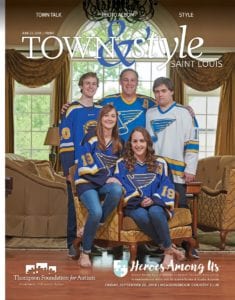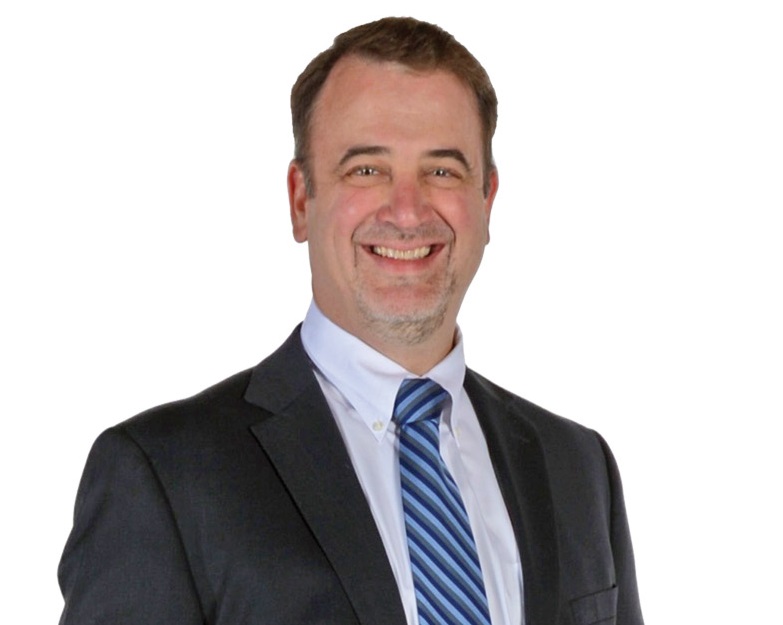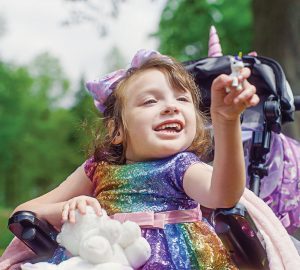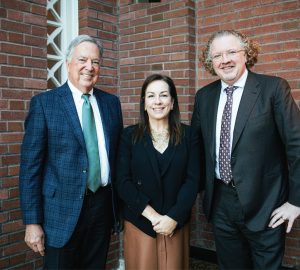Around one in every 59 children in the U.S. has been diagnosed with an autism spectrum disorder (ASD), according to the Centers for Disease Control and Prevention. Those impacted can face daily difficulties with communication, learning and interacting with the world. It is the mission of the Thompson Center for Autism and Neurodevelopmental Disorders at the University of Missouri-Columbia to improve the lives of individuals and families affected by ASD and similar conditions through research, clinical services and education. The Thompson Foundation for Autism is an active partner in supporting the center’s initiatives.
 “I’m really proud to be a part of an organization that provides quality services to families in need,” says Emma Keicher, senior behavior analyst at the Thompson Center. Keicher works in the center’s severe behavior clinic, which helps children dealing with issues like aggression, property destruction and self-harm. “Many of our clients have been kicked out of school, and other providers cannot treat them because of the severity of their behaviors,” she says. “There are not many clinics that are able to provide the assessment and treatment we can, thanks to the support of the university.”
“I’m really proud to be a part of an organization that provides quality services to families in need,” says Emma Keicher, senior behavior analyst at the Thompson Center. Keicher works in the center’s severe behavior clinic, which helps children dealing with issues like aggression, property destruction and self-harm. “Many of our clients have been kicked out of school, and other providers cannot treat them because of the severity of their behaviors,” she says. “There are not many clinics that are able to provide the assessment and treatment we can, thanks to the support of the university.”
Since its founding in 2015, the clinic has treated 23 children. Clients come three days a week for two-hour, one-on one sessions. Treatment begins with an assessment using functional analysis, according to Keicher. “We determine the function of the problem behavior,” she explains. “Often, the child’s goal is to get access to something he or she wants. We teach appropriate replacement behaviors and how to tolerate delay.” To ensure the interventions can be implemented in clients’ everyday lives, they also are taught to parents, caretakers and school staff.
Carrie Kremer knows first-hand the positive impact the severe behavior clinic can have. The St. Louisan is a mother of five, and her daughter Lilly was diagnosed with ASD at age 3. As Lilly got older, difficulties communicating led to frustration, aggressive behavior and self-harm, Kremer says. “It was like she was in her own little world,” she explains. “She wouldn’t engage with us and wasn’t meeting her goals at school.”
Like all families, the Kremers wanted to give Lilly the best quality of life possible, so they brought her to the Thompson Center. She went to the severe behavior clinic for eight months, and the results were tremendous, according to Kremer. She says Lilly now engages with the family, plays with her siblings, and tries different ways of communicating with her teacher and classmates. “It has been an amazing transformation,” Kremer says. “We have been blessed beyond words to work with the clinic’s therapists and doctors. They never gave up on Lilly, which gave us hope.”
Services like these are possible thanks to the support of the foundation. The nonprofit’s largest annual fundraiser is its Heroes Among Us gala, to be held Sept. 28 at Meadowbrook Country Club. The evening will include dinner, a wine pull, and live and silent auctions. The event is presented in partnership with the St. Louis Blues. Former Blues right winger Scott Mellanby and his wife, Sue, are honorary co-chairs, and they will share their family’s personal journey with autism.
The Thompson Foundation for Autism supports the Thompson Center for Autism and Neorodevelopmental Disorders at the University of Missouri-Columbia. Its 12th Annual Heroes Among Us Gala is Sept. 28 at Meadowbrook Country Club. Pictured on the cover, standing: Nick, Scott and Carter Mellanby. Seated: Sue and Courtney Mellanby. For more information, call 314.550.2888 or visit heroesamongusstl.info.
Cover design by Julie Streiler
Cover photo by Tim Parker Photography
Pictured above: Thompson Center executive director Stephen Kanne.








